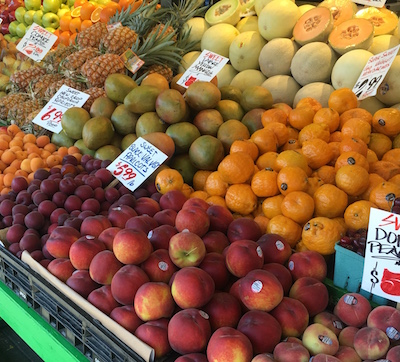I’m often asked if buying organic food is worthwhile, particularly organic fruits and vegetables. My usual answer is “it depends”, which is generally not the answer people are looking for. But here’s my rationale: If your goal is to protect the environment, by all means buy organic, as organic farming methods are certainly more environmentally friendly than conventional farming.
However, if your buying decision is solely based on a belief that organic produce has greater nutritional value, you might want to reconsider.
Some Good Reasons to Buy Organic Produce
Organic produce is essentially that which is grown, harvested, stored and transported without the use of synthetic chemicals, irradiation or fumigants. Such farming methods are undeniably beneficial for the environment, as the chemicals and preservation techniques otherwise used in conventional farming can leach into water supplies and adversely impact agricultural sustainability and ecosystems.
Since human beings are an integral part of ecosystems and the environment is an important determinant of health, this is definitely a strong case for going organic. Opting for organic produce can also reduce your dietary exposure to potentially toxic chemicals, namely pesticide residues, which may have adverse health effects.
The Environmental Working Group (EWG) is a nonprofit environmental research organization that conducts annual laboratory reports that specifically highlight selected fruits and vegetables containing the highest amounts of pesticide residues. Interestingly, their most current findings show relatively higher levels in strawberries, apples, nectarines, peaches, celery, grapes, cherries, spinach, tomatoes, bell peppers, and cucumbers (click here for the full EWG report).
Now, it’s important to understand that pesticides are extensively used worldwide and exposure can happen in a number of other ways (contact with treated surfaces or objects through touch or inhalation). So know that going organic doesn’t ensure protection.
The Real Nutritional Value of Organic Produce
 Most people purchase organic fruits and vegetables in mass believing they are healthier than produce that’s conventionally cultivated. Unbeknownst to many, there are no considerable differences in the overall nutritional quality of organic versus conventional produce.
Most people purchase organic fruits and vegetables in mass believing they are healthier than produce that’s conventionally cultivated. Unbeknownst to many, there are no considerable differences in the overall nutritional quality of organic versus conventional produce.
Regardless of farming practices, all types of produce are rich in vital micronutrients like vitamins, minerals, and antioxidants.
Related Article: Micronutrients: The Nutritional Building Blocks for Good Health
Some organic produce has been shown to house higher levels of certain antioxidants (vitamin C and carotenoids) when compared to conventional produce. However, differences in overall content are generally modest and can vary considerable from farm to farm and among different varieties of the same crop. Moreover, increased levels of these micronutrients hasn’t been linked to added health benefits or disease protection.
Things to Consider Before Buying Organic Produce
Before buying organic produce you should definitely consider your budget. Organic produce can cost up to 40% more than produce that’s conventionally cultivated due to the relatively higher costs associated with organic farming. If you’re on a fixed budget and cost is an issue, you can still reap health benefits from conventional produce. What’s most important is that your diet is rich in fruits and vegetables.
Related Article: A Simple Guide to Eating Sensibly
I’m personally a huge fan of buying fresh fruits and vegetables from small and mid-sized local farms. Whether you opt for organic or conventional produce, shopping at local farms or local farmers’ markets is a great way to get high-quality foods that are locally produced. Most farmers are present and more than happy to answer any questions you may have about their production practices, chemical usage, and organic certifications.
Local farmers are good people who care for their farm environment. For these farmers, farming is as much a way of life as a way to make a living.
Choosing to Buy Conventional Produce
My goal here is not to create an argument against buying organic produce. I just want you to understand that you actually have many options with conventional produce if you so choose not to go the organic route. Given that certain fruits and vegetables are either sprayed with pesticides more heavily than others or have no protective outer skin to prevent or inhibit pesticide penetration you definitely want to make wise purchases.
I highly recommend using the aforementioned EWG’s annual laboratory report to guide your purchasing decisions.
If you choose to buy conventional produce, you can remove some pesticide residues by thoroughly soaking and rinsing your foods with a biodegradable fruit and vegetable wash. This is also a good idea with organic produce, as it isn’t completely devoid of toxic chemicals. Another option is to make your own wash by mixing equal parts white vinegar and water—Although this method might not be as effective as the former.
All things considered, opting for organic produce can certainly reduce dietary exposure to pesticides and is undeniable better for the environment.
Given that human beings are an important part of the ecosystem, many would argue that your decision of whether or not to buy organic could impact your health, either directly or indirectly. There are plenty of reasons to buy organic produce. Unfortunately, in many cases, cost and availability are real limiting factors so there’s no need to feel ashamed or guilty about purchasing conventional fruits and vegetables.
Related Article: Eight Super-Simple Ways to Get More Veggies Into Your Diet
Again, organic produce has no superior nutrition-related benefits when compared to conventional produce. So, if you choose to consume conventionally cultivated fruits and vegetables as part of a healthy, balanced diet, rest assured that you’ll still acquire all the micronutrients your body needs from these foods. It’s just important to make sure you’re taking the extra steps necessary to reduce unnecessary pesticide exposures.







